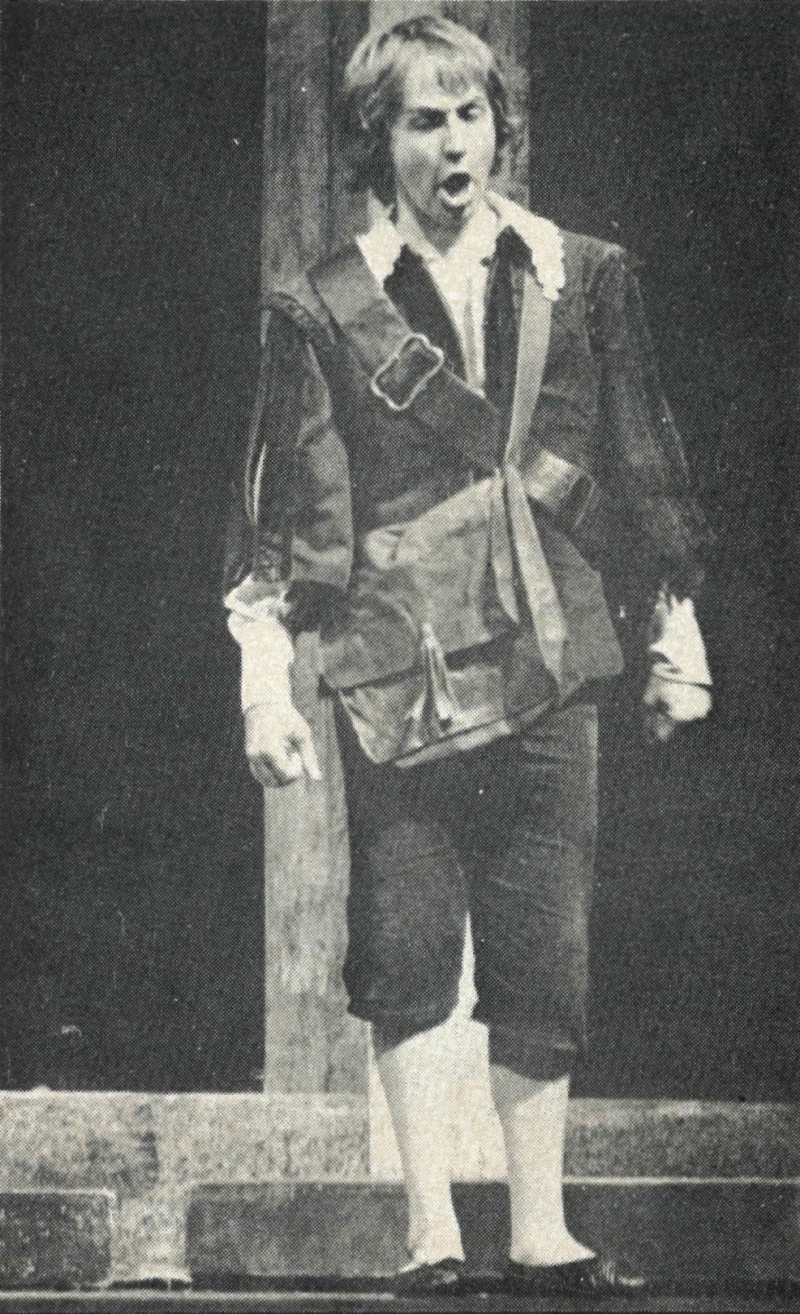The Manitoba Opera Association: Don Giovani
The Manitoba Opera Association opened its season with no less than Mozart’s Don Giovanni (Nov. 10, 12, 14). It is an opera that bristles with all sorts of difficulties: let it be said at the outset that Winnipeg saw a very honourable presentation of it.
Since the nineteenth century, the story of Don Juan has tended to assume somewhat tragic proportions in the eyes of many interpreters. The profligate given his just deserts sometimes turns out to be a hero vastly superior to those who condemn him. Moliere’s atheistic Juan did not provoke a laugh at all in a fairly recent film version: despite all the clear indications of Moliere’s text, it seems an atheist cannot be a comic character in this century!
The same tendency to darken the colours of the Don Juan story have been noticeable in contemporary interpretations of Mozart’s opera, the most flagrant case being the scene by scene analysis of it by the French novelist-poet—and musicographer—Pierre-Jean Jouve. True, Mozart wrote his glorious music for so poor a libretto that his and Da Ponte’s intentions must forever remain a little obscure, but isn’t the tragic approach contradicted at almost every turn by the music? It is practically always light in colour and rapid in pace (it rarely falls below andante and even andante is uncommon). The Don’s own music hardly reveals hidden depths: it is effervescent (Fin ch’han dal vino) and seductive and false (La ci davem la mano and V’e gente alla finestra).
The other noble characters of the opera are also strangely unmoving. Why do we not feel more pity for Donna Anna? How can we feel anything very much at all for poor, dotty Donna Elvira, who alternates between angular arias denouncing the fickle Don and melting submission to his slightest attentions? Don Ottavio is a non-person who simply has two beautiful arias to sing. The only successfully drawn and engaging characters are the humble and obviously comic Leporello, Zerlina and Masetto.

Scene from Don Giovanni. Photographs by Paul Deleske, courtesy of the Winnipeg Symphony.
I think, therefore, that it was very wise of almost everyone connected with the Don Giovanni in Winnipeg to present the opera with a minimum of unconvincing plumbing of hypothetical depths. The falsest note in the production was not an auditory one, in fact, but the genuinely ugly and gloomy sets, which have no obvious connection with the spirit of the performance.
The spirit was clear right from the Overture. The Andante introduction was not too portentous (perfectly in keeping with the unusually undramatic presentation of Act II Scene XV where the Commendatore comes to punish the wicked Don) and the Molto Allegro was sparkling without being pushed to the point that it sounded like Rossini. This is a real danger in much of the allegro music of this opera (Act I Scene VII, for example), and the conductor Anton Guadagno must be congratulated for his judicious handling of both the music and the orchestra, which played very well for him on the Monday when I was present.
As for the singers, they too seemed content to treat the opera in comic terms. Robert Hale as Don Giovanni added no extra dimensions to the role. In fact, he perhaps subtracted a little of the Don’s charm and seductiveness. Hale looks good on the stage and he has a suitable voice, but he did not seem particularly intent on winning the ladies or the audience; “La ci davem la mano” can be quite a different experience from what he made of it. Heather Thomson as Donna Elvira put on the charm, however, and never has this character been quite so comic in my experience. This might have displeased some of the audience, but for me it made good sense of the constant coming and going of Elvira and of her unstable moods. Unfortunately Miss Thomson’s voice was far less at ease with Mozart’s music than it has been on other occasions (especially in a very fine la Traviata).
Most impressive of the whole cast was Clarice Carson as Donna Anna. Miss Carson had the most commanding of the voices that we heard, and it must be said that her presence on the stage was also somewhat formidable. Perhaps Miss Carson outshone the rest of the cast just a little too much for the benefit of the whole production, but it does seem unkind to regret her excellence! The voice is big but can be also remarkably flexible, pianissimo and light. The range of its expression is exceptional.
The rest of the cast was also generally good. Jerry Jennings (Don Ottavio) was not completely comfortable, perhaps through illness; Sylvia Richardson (Zerlina) is hampered only by the smallness of her voice. Claude Corbeil (Leporello) and Alphonse Tetreault (Masetto) both resisted turning their roles into grotesque farce. I thought Mr. Tetreault did his finest work so far in this opera.
I wonder why Don Giovanni did not inspire more enthusiasm in the Winnipeg audience. After all, there is more beautiful and tuneful music in one scene of this opera than in many yards of Puccini. I think that the visual drabness perhaps cast something of a pall over the proceedings, and I suppose too that the production was not entirely consistent in its presentation. I have stressed that it appeared to me intentionally comic, but it must be admitted that at times when the comic spirit was less easy to project it happened that nothing very much was projected. There was a certain intermittent loss of focus and thus an impression of Longueurs. Fine as it was, it must nevertheless be admitted that our first Mozart opera did not receive full justice.
John Clark has previously contributed articles on the symphony to Arts Manitoba. He teaches French at the University of Manitoba.

